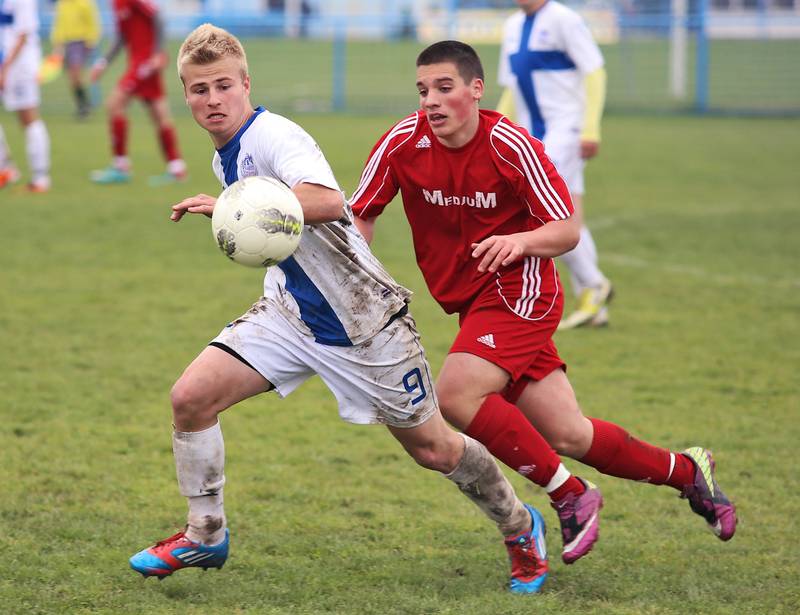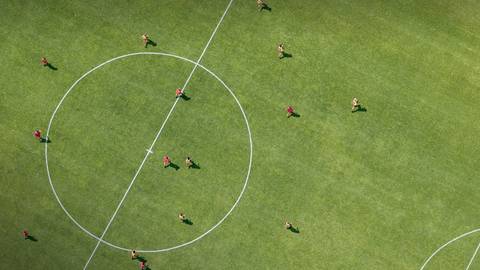U14 football represents a crucial developmental stage for young players as they transition into more structured and competitive environments. At this age, players begin to take on more responsibility and deepen their tactical understanding of the game. Coaches working with U14 teams should focus on developing technical skills while introducing more complex tactical concepts, as these formative years often determine a player's long-term potential in the sport.
The U13-U14 age group marks an important shift in youth football, where physical differences between players become more pronounced and game awareness grows significantly. This period presents unique coaching challenges as young footballers experience growth spurts at different rates, requiring training approaches that accommodate these variations. While some countries might refer to this age group as "soccer" for clarity, in the UK it remains firmly football—a time when young athletes begin to specialise in positions and develop their individual playing styles.
Football at the U14 level provides an excellent foundation for future development, with training sessions becoming more position-specific and tactically nuanced. Players at this stage can absorb more complex concepts and typically show greater commitment to improving their game. Coaches must balance technical development with appropriate physical conditioning, ensuring players build strength and stamina without risking injury during these formative years.
Understanding U14 Football
U14 football represents a crucial developmental stage where young players transition to the full-sized game. At this age, tactical awareness and positional understanding become increasingly important, while technical skills continue to be refined at greater speed and complexity.
Age Group Characteristics
U14 players typically show significant physical development, though growth rates vary considerably among individuals. Players at this age often demonstrate improved coordination and motor skills, allowing them to execute more complex technical movements with greater precision.
Cognitively, U14s can understand and apply more sophisticated tactical concepts. They begin to recognise patterns of play and can better anticipate game situations. This age marks a critical period for developing positional awareness and understanding team structure.
Socially, these youngsters value peer relationships highly. Team dynamics become increasingly important, with players developing stronger connections with teammates. Coaches should recognise this by incorporating collaborative training exercises that foster teamwork.
Emotionally, U14 players may experience fluctuations in confidence as they become more self-aware. Constructive feedback balanced with positive reinforcement helps maintain motivation and enjoyment.
Rules and Regulations
In U14 football, matches are typically played in the 11v11 format on standard-sized pitches (approximately 100×60 yards). Games generally consist of two 35-minute halves, though this may vary slightly between different competitions and regions.
The offside rule applies fully at this level, requiring players to develop a proper understanding of positioning. Standard football laws regarding fouls, set-pieces and substitutions are enforced, preparing players for the adult game.
Equipment regulations include:
- Size 4 or 5 footballs (depending on the competition)
- Mandatory shin guards
- Appropriate footwear for the playing surface
Many leagues implement playing time guidelines to ensure all squad members receive adequate match experience. Some competitions also enforce rules about retreat lines for goal kicks or goalkeeper distribution to encourage building play from the back.
Coaches should focus on tactical development while maintaining technical work. Training sessions typically balance defensive organisation (maintaining compact lines without gaps) with attacking principles including quick transitions and forward passing combinations.
Competitions and Leagues
U14 football competitions provide structured environments where young players can test their skills against peers of similar age and ability levels. These competitive frameworks help youngsters develop technically and tactically while learning important lessons about teamwork and sportsmanship.
Local and Regional Tournaments
Local leagues form the backbone of U14 football development across the UK. Most communities offer council-run leagues where clubs compete weekly throughout the autumn-spring season. These competitions typically divide teams into divisions based on ability, ensuring appropriate challenge for all participants.
County FA Cup tournaments provide exciting knockout competitions that run alongside regular league fixtures. These prestigious local cups often culminate in finals at professional club training grounds or smaller stadiums, giving youngsters a taste of the big-match atmosphere.
Many regions also host holiday tournaments during school breaks. These short-format competitions, ranging from one-day festivals to week-long events, allow teams to face unfamiliar opponents from neighbouring areas.
Private tournaments organised by clubs or commercial entities have grown increasingly popular. These events often feature innovative formats such as small-sided matches or round-robin structures that guarantee multiple games.
National Championships
The most talented U14 teams can progress to prestigious national competitions. The English Schools' FA (ESFA) runs the premier national schools competition, featuring district and county representative teams alongside school squads.
Professional club academies compete in the Elite Player Performance Plan (EPPP) games programme. This highly competitive environment pits the best youth teams against each other in matches focused on development rather than just results.
The Junior Premier League (JPL) offers another nationwide structure for ambitious grassroots clubs. With regional qualifying feeding into national finals, this provides a taste of high-level football without requiring academy affiliation.
For grassroots teams, the renowed Manchester United Premier Cup represents one of the few opportunities to compete in tournaments with international participation. Regional qualifiers lead to national finals and potentially international representation.
Several national soccer tournaments accept international entries, creating opportunities for British teams to test themselves against diverse playing styles from across Europe.
Player Development in U14 Football
Player development at the U14 level represents a critical phase where young footballers begin to refine technical skills while building physical capabilities. This stage bridges fundamental skill acquisition and more advanced tactical understanding, with proper guidance from both coaches and parents playing a vital role.
Training and Skill Enhancement
U14 players enter the "training to train" stage, covering ages 11 to 16, where building an aerobic base becomes essential alongside technical skill development. Coaches should implement diverse training drills that challenge players while maintaining enjoyment through game-like scenarios.
Practice sessions should balance:
- Technical skills (passing, receiving, shooting)
- Tactical awareness (positional play, decision-making)
- Physical development (stamina, strength appropriate for age)
Football drills must accommodate varying experience levels, as U14 teams often include players with different backgrounds—from club-level competitors to relative newcomers. Using neutral players during practice games helps develop versatility and encourages all participants to engage regardless of skill level.
Role of Adult Members in Youth Sports
Parents, coaches and other adult stakeholders have significant influence on U14 player development through their attitudes and approaches. Creating personal player development plans with 3-4 key focus areas helps track progress and provides clear objectives for improvement.
Adult members should:
- Offer constructive feedback rather than criticism
- Recognise individual progress over team results
- Create supportive environments where mistakes are learning opportunities
Parents and coaches must collaborate to ensure consistent messaging about development priorities. This partnership helps young players navigate the increasing commitment required at this age without feeling overwhelmed by pressure or conflicting expectations.
Effective adult guidance balances pushing players to improve while maintaining their passion for the sport, recognising that not all U14s will progress to elite levels but all deserve quality development experiences.
Show less










